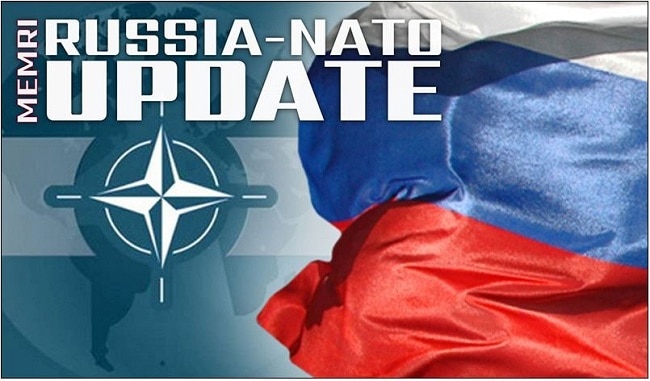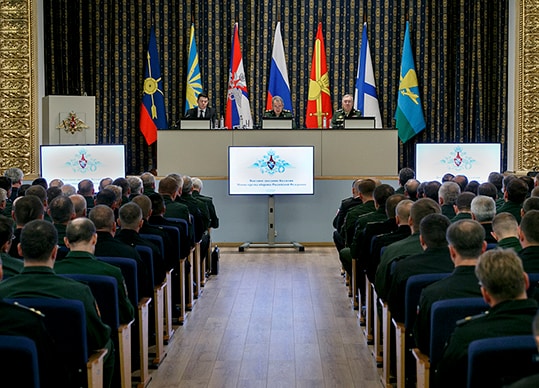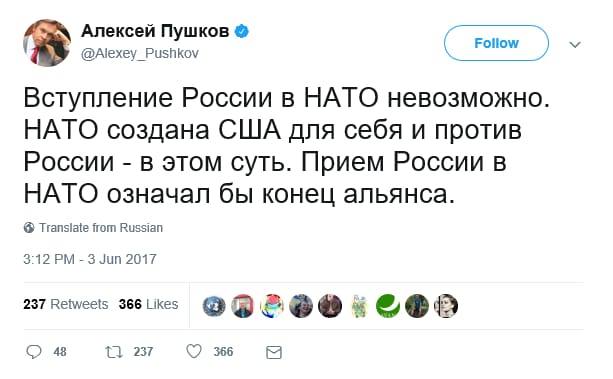Russia-NATO Update is a new monthly review by the MEMRI Russian Media Studies Project, covering the latest news on Russia-NATO relations from the Russian and East European media.

Photos Of The Month

Russian Minister of Defense Sergey Shoigu visits Russia's Baltic enclave in Kaliningrad (Source: Mil.ru, June 6, 2017)

Another photo from Shoigu's visit to Kaliningrad (Source: Mil.ru, June 6, 2017)
Quote Of The Month
Vice PM Dmitry Rogozin, a former Russian permanent representative to NATO, said: "NATO will fall apart, because it lacks a purpose. NATO starts being bored, and withers when they have difficulties with the 'enemy's image.' At the moment they've recreated that 'image of enemy' in the form of Russia – this image had subsided and become defunct during the 90s, now it's on the rise again. Sanctions and all the current policies [against us] are collapsing. We see that at our meetings with top politicians and economists from the Western countries. The economic and political situation will develop all the same in such a way that NATO will lose its raison d'être ".
(Ria.ru, June 2, 2017)
Sergei Zheleznyak, a member of the Russian State Duma's foreign affairs committee member said:
"It's clear that by portraying a non-existent Russian threat and imposing block-oriented thinking, the U.S. and NATO countries are trying to influence political processes domestically and internationally... NATO knows full well that Russia threatens no one, but NATO has to understand that we find provocations and threats inacceptable. It's more effective in our mutual relations to aspire to an honest and open dialogue, that involves mutual respect and equal rights ".
(Ria.ru, May 26, 2017)
Speeches Of The Month
Lavrov: 'NATO Is Taking Decisions That Grossly Violate The NATO-Russia Founding Act's Provisions'
The following are excerpts of Foreign Minister Sergey Lavrov’s remarks at Immanuel Kant Baltic Federal State University, in Kaliningrad, on June 6, 2017:
"The principle of good-neighborliness is an axiom for Russia with regard to the European Union and the EU member countries, with whom we share not just common historical, cultural and civilizational roots, but also rich trade, economic, cultural and humanitarian exchanges. We work consistently to promote a positive, unifying, and future-focused common European agenda aimed at keeping life on a peaceful track. We have proposed numerous initiatives for building up broad mutually advantageous cooperation, from the basic step of abolishing such relic as visas to joint work with the European Union on crisis regulation and on uniting our countries' energy markets. We have done everything we can to ensure that dialogue between countries in the Euro-Atlantic region develop on the basis of international law. Back in 2008, we proposed concluding a treaty on European security, which would have legalized the political obligations taken earlier at the highest level through the OSCE on indivisible security, which means that no country has the right to strengthen its security at the expense of others' security.
"Sadly, our partners did not support this initiative. They preferred a policy of military-political containment of Russia, which is manifested in the greedy and hasty action to occupy any geopolitical space that opens up, NATO expansion to the east, despite assurances once made to Soviet leadership that this would not happen, and the European Union's Eastern Partnership. This program, and the other Western actions mentioned, took the logic of a false choice: 'you are either with the West or with Russia,' and not the logic of the grand promises and assurances of commitment to the philosophy of a 'common European home.'
"NATO said directly in its time that only NATO member countries can have legal guarantees of security. We got a clear illustration of the harm this zero-sum game can cause in the armed coup d'état in Ukraine, which was supported by Washington and Brussels and carried out by ultra-radical forces, who continue to run the show in Ukraine today and block all efforts to implement the Minsk Agreements and settle the internal crisis in Ukraine. Their Western patrons are powerless and cannot call the radicals to order.
"In May of this year, we marked the 20th anniversary of the signing of the Russia-NATO Founding Act and the 15th anniversary of the Rome Declaration on a new quality of relations between Russia and NATO. But we have not achieved these documents' goal of overcoming the remnants of confrontation and rivalry and strengthening mutual trust and cooperation, primarily because NATO has remained a Cold War institution that has proven itself unable to respond adequately to the new millennium's challenges. Today, NATO is taking decisions that grossly violate the NATO-Russia Founding Act's provisions. The scale of military activity has increased dramatically and there is a build-up of military presence and infrastructure in regions bordering Russia, including along the borders of the Kaliningrad Region. These actions clearly exacerbate the situation and fuel a new spiral in the arms race. What NATO calls shamefacedly the 'eastern flank' is threatening to become the 'eastern front,' with all the ensuing destructive consequences for Europe."
(Mid.ru, June 6, 2017)
Russia's Ministry of Defense Sergey Shoigu's Speech At The Board Session Of The Ministry of Defense In Kaliningrad: Western Actions Lead To The Destruction Of The Global Security System

(Source: Mil.ru)
"… The Russian defense Minister started with an analysis of the current situation at the Western borders of Russia, which 'has a tendency to deteriorate.' 'This is due to increasing military activity of NATO in the Eastern Europe,' stressed the Minister of Defense.
"NATO is increasing its presence in the Baltic States… In the Baltic States and Poland, the formation of four battalion tactical groups is being completed, the total number will be around 5,000 servicemen with weapons and military hardware.
"The deployment of the European segment of the U.S. global missile defense is continuing. In 2018, in addition to missile defense base in Romania, it is planned to put into service a similar facility in Poland.
SUPPORT OUR WORK

"The intensity of operational and combat training of the Alliance is increasing.
"Large-scale exercises of the Alliance, such as 'Baltops-2017' and 'Sabre Strike – 2017', are being held at the Russian borders. More than 10,000 servicemen, more than 70 ships and auxiliary vessels, about 70 aircraft, including American bombers B-52 are involved in these exercises. 'It demonstrates the reluctance of the Western partners to abandon the anti-Russian course. This is evidenced by the summit of NATO on May, where international terrorism and Russia were placed in the position of the threats,' said the Minister of defense. He also noted that 'some countries are seeking to use military force as a tool to achieve geopolitical goals, apart from political, informational and economic pressure.'
"'These unjustified actions of our Western colleagues lead to the destruction of the security system in the world. It increases mutual distrust and force us to use responses, primarily in the Western strategic direction,' said Sergey Shoigu. He also added that the Russian response to such unfriendly acts is the improvement of combat strength of the Russian troops and system of their location. About 20 formations and military units will be formed in the Western military district until the end of the year.
"All organizational arrangements are synchronized with the supply of modern weapons. Within last six months’ troops and forces of the district received more than 300 pieces of weapons and military hardware. More than 30 battalion and company tactical groups are ready for immediate combat use, which are staffed and equipped with the necessary financial and human resources.
"With the beginning of the year in the Western military district conducted more than 100 unannounced inspections, which confirmed the combat readiness of troops. After a long break the presence of warships of the Baltic Fleet in operationally important areas of the Atlantic Ocean is resumed.
"Preparation for the planned strategic exercises 'West-2017' has begun. It will be attended by Belarusian and Russian servicemen. 'Our partners will receive more detailed information about this exercise as through diplomatic channels and through mass media within the established international contract terms. The events will be open to international observers and journalists,' said Sergey Shoigu, stressing that 'much less troops and hardware will be used in the exercise West-2017 than in similar maneuvers of NATO countries in Europe.'
"The minister of defense proposed to review the providence of the Russian military security in the Western strategic direction and the measures taken for its improvement. The senior personnel of the Armed Forces, acting Governor of the Kaliningrad region Anton Alikhanov, representatives of bodies of state power and the military-industrial complex participated in the Board session of the Ministry of defense."
(Mil.ru, June 21, 2017)
In The News
NATO Military Spending
Russian Security Council Assistant Secretary Venediktov: NATO's Boosting Military Spending Won’t Solve Any Problem
Russian Security Council Assistant Secretary Alexander Venediktov said in an interview with the Argumenty i Fakty weekly newspaper: "The Western countries have lost a lot due to anti-Russian sanctions, according to the United Nations’ assessments that’s up to $100 billion… I think such unilateral undertakings may only contain social and economic development of NATO’s member-states… Boosting military or other spending won’t solve any problem. It is also absurd to link this process to the supposed need to repel threats allegedly coming from Russia… It is time to switch from confrontational rhetoric to systematically taking into account security concerns of each other."
(Tass.com, June 6, 2017)
Deputy FM Karasin Criticizes Georgia-NATO Cooperation
Deputy FM Grigory Karasin commented on NATO's desire to cooperate with Georgia: "Unfortunately, instead of building a good neighborly and equal rights dialogue with Abkhazia and South Ossetia, Tbilisi keeps insisting on their 'occupation' by Russia. This absurd thesis is being used as an argument in favor of drawing closer to NATO. Regrettably, in this case the position of the current Georgian authorities is no different than that of the [Mikheil] Saakashvili regime.
"Moreover, recently Georgia –NATO cooperation is taking a shape, which effectively makes Tbilisi a participant in the NATO policy of 'containing' Russia…. For the second year in a row, they conduct drills on the rapid deployment of heavy armored vehicles from Europe. NATO's Parliamentary Assembly, which has recently taken place in Tbilisi, and the declaration adopted there clearly demonstrate Alliance's commitment towards Georgia and its desire to 'gain a firm foothold' in the South Caucasus."
(Iz.ru, June 29, 2017)
Putin Claims He Advised Bill Clinton To Consider The Option Of Russia Joining NATO
In an interview to American movie director Oliver Stone, Russian President Vladimir Putin said that he suggested to former U.S. President Bill Clinton that Russia might join NATO.
Russian news agency TASS reported:
"'I remember one of our last meetings with President Clinton when he came to Moscow. During the meeting I said, 'we should consider an option that Russia might join NATO.' Clinton said, 'Why not?',' Putin said, noting that 'the U.S. delegation got very nervous.'
"'Have you applied?' asked Stone… 'Nowadays, NATO is a mere instrument of foreign policy for the U.S. It has no allies, it has only vassals,' Putin said. 'Once a country becomes a NATO member, it is hard to resist the pressure of the U.S., a major country and NATO leader. And all of a sudden any weapon system can be placed in this country - an anti-ballistic missile system, new military bases and if need be, new offensive systems.'
"'And are we supposed to do?' the Russian president asked a rhetorical question.
"'In this case we have to take countermeasures. We have to aim our missile systems at facilities that in our opinion, are threatening us,' he said. 'The situation becomes tenser.'
"'Why are we so acutely responding to the expansion of NATO? Well, as a matter of fact, we understand the value or lack thereof, and the threat of this Organization. But we are concerned about is the following. We are concerned by the practice of how decisions are taken [in the alliance],' Putin said."
(Tass.com, June 3, 2017)
Commenting on Putin's words, former Russian FM Igor Ivanov said:
"Officially we have not proposed anything like that. Personally, I did not take part in consultations on that issue". He then added: "Back then, there was an unofficial, hypothetical contemplation that if NATO would remake itself and stop being an aggressive military block targeted at the East, then why should Russia not join? But taking into consideration that NATO did not change its character, Russia's attitude to NATO did not change either."
(Ria.ru, June 3, 2017)
Russian public intellectual Fyodor Lukyanov, Editor-in-Chief of Russia in Global Affairs, Chairman of the Presidium of the Council on Foreign and Defense Policy, and Research Director of the Valdai International Discussion Club, said:
"It's widely known that Putin proposed the same thing not only to Clinton, but also to George Robertson, then NATO's secretary-general: back then he said that this possibility is not to be excluded."
According to Lukyanov, joining NATO "implied that a new center of influence would have emerged in NATO, comparable to U.S. [influence]". He then added: "It could not have happened in any other way – Russia would have barely adhered to the common discipline in the Alliance. That would have altered the Alliance's internal substance – and no one was ready for that (in the West)".
(Ria.ru, June 3, 2017)
Senator Alexey Pushkov wrote in his Twitter account: "Russia's accession to NATO is impossible. NATO was created by the U.S. for their own purposes and against Russia – that's the essence. Russia's accession to NATO would have signified the end of [the NATO] alliance."
(Twitter.com/Alexey_Pushkov, June 3, 2017)

(Source: Twitter.com/Alexey_Pushkov, June 3, 2017)
Official MFA Statement On Russia-NATO Anniversary Of Relations: 'We Have To Point Out That Russia-NATO Relations Are The Worst They Have Ever Been Since The End Of The Cold War'
"These days we will mark 20 years of the Founding Act on Mutual Relations, Cooperation and Security, which Russia and NATO signed in Paris on May 27, 1997, and 15 years of the declaration titled Russia-NATO Relations: A New Quality, which was adopted at the Russia-NATO summit meeting in Rome on May 28, 2002.
"We have to point out that Russia-NATO relations are the worst they have ever been since the end of the Cold War. NATO has unilaterally suspended all practical cooperation projects in the sphere of common interests, which were stipulated in the above mentioned documents and which greatly contributed to European security. While agreeing on the importance of eliminating dividing lines in Europe, Western countries have opted for close-ended NATO-centric security architecture. Furthermore, they have adopted a strategy of containment for Russia, which has directly provoked the growth of the conflict potential in the Euro-Atlantic region.
"The actions by NATO to strengthen its 'eastern flank' and build up its military presence and infrastructure on the border with Russia are eroding the provisions of the Founding Act, primarily the commitment to 'carry out its collective defense and other missions by ensuring the necessary interoperability, integration, and capability for reinforcement rather than by additional permanent stationing of substantial combat forces.' We interpret the forward presence of NATO forces, irrespective of their objectives, as permanent stationing, and it does not matter that personnel will be deployed there on a rotational basis.
"We consider the attempts to circumvent the principles of the Founding Act to be dangerous and contradicting the true interests of the NATO states themselves. We see this as the alliance’s intention to give legitimacy to its military preparations in proximity to Russia’s borders, which, taken together with the military activity of some bloc members, are changing the balance of forces in Europe and can provoke a new dangerous round in the arms race.
"The quality of European and global security largely depends on relations between Russia and NATO as major military and political factors. The bloc’s efforts to prove its worth by fanning the myth about the 'threat from the East' are preventing countries from rallying to fight common threats and challenges.
"The growing negative trends are not Russia’s choice. They are a direct result of the destructive policy the bloc has been recklessly waging for years to attain military and political domination in European and global affairs. Attempts to develop relations with Russia in the spirit and with the help of instruments from the era of confrontation must be abandoned before it is too late.
"Although the current situation is extremely complicated, we are convinced that if we managed to hold fruitful discussions on the problems during the period of confrontation, we can do the same now when there are no ideological differences between the Euro-Atlantic countries. The main thing is to open one’s eyes to reality, cleanse our interpretation of modern processes of political influences and look into the future not only in the interests of the club of select countries, but all European nations without exception."
(Mid.ru, May 26, 2017)




